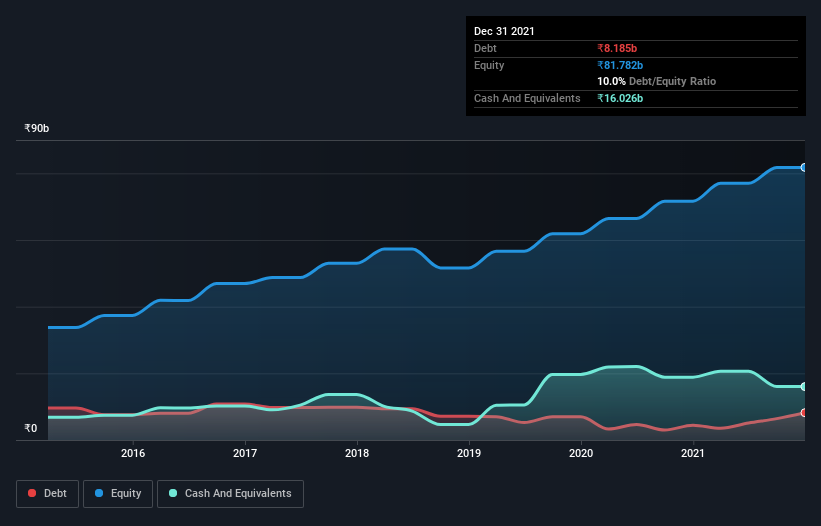Warren Buffett famously said, 'Volatility is far from synonymous with risk.' So it seems the smart money knows that debt - which is usually involved in bankruptcies - is a very important factor, when you assess how risky a company is. As with many other companies Dabur India Limited (NSE:DABUR) makes use of debt. But the more important question is: how much risk is that debt creating?
What Risk Does Debt Bring?
Generally speaking, debt only becomes a real problem when a company can't easily pay it off, either by raising capital or with its own cash flow. Ultimately, if the company can't fulfill its legal obligations to repay debt, shareholders could walk away with nothing. However, a more frequent (but still costly) occurrence is where a company must issue shares at bargain-basement prices, permanently diluting shareholders, just to shore up its balance sheet. Of course, debt can be an important tool in businesses, particularly capital heavy businesses. When we examine debt levels, we first consider both cash and debt levels, together.
View our latest analysis for Dabur India
What Is Dabur India's Debt?
The image below, which you can click on for greater detail, shows that at September 2021 Dabur India had debt of ₹8.18b, up from ₹4.44b in one year. But on the other hand it also has ₹16.0b in cash, leading to a ₹7.84b net cash position.

How Strong Is Dabur India's Balance Sheet?
Zooming in on the latest balance sheet data, we can see that Dabur India had liabilities of ₹32.5b due within 12 months and liabilities of ₹2.33b due beyond that. Offsetting these obligations, it had cash of ₹16.0b as well as receivables valued at ₹7.24b due within 12 months. So its liabilities total ₹11.5b more than the combination of its cash and short-term receivables.
Having regard to Dabur India's size, it seems that its liquid assets are well balanced with its total liabilities. So while it's hard to imagine that the ₹980.1b company is struggling for cash, we still think it's worth monitoring its balance sheet. While it does have liabilities worth noting, Dabur India also has more cash than debt, so we're pretty confident it can manage its debt safely.
And we also note warmly that Dabur India grew its EBIT by 19% last year, making its debt load easier to handle. When analysing debt levels, the balance sheet is the obvious place to start. But it is future earnings, more than anything, that will determine Dabur India's ability to maintain a healthy balance sheet going forward. So if you're focused on the future you can check out this free report showing analyst profit forecasts.
But our final consideration is also important, because a company cannot pay debt with paper profits; it needs cold hard cash. Dabur India may have net cash on the balance sheet, but it is still interesting to look at how well the business converts its earnings before interest and tax (EBIT) to free cash flow, because that will influence both its need for, and its capacity to manage debt. During the last three years, Dabur India generated free cash flow amounting to a very robust 80% of its EBIT, more than we'd expect. That puts it in a very strong position to pay down debt.
Summing up
While it is always sensible to look at a company's total liabilities, it is very reassuring that Dabur India has ₹7.84b in net cash. And it impressed us with free cash flow of ₹14b, being 80% of its EBIT. So we don't think Dabur India's use of debt is risky. When analysing debt levels, the balance sheet is the obvious place to start. However, not all investment risk resides within the balance sheet - far from it. Be aware that Dabur India is showing 1 warning sign in our investment analysis , you should know about...
If, after all that, you're more interested in a fast growing company with a rock-solid balance sheet, then check out our list of net cash growth stocks without delay.
New: Manage All Your Stock Portfolios in One Place
We've created the ultimate portfolio companion for stock investors, and it's free.
• Connect an unlimited number of Portfolios and see your total in one currency
• Be alerted to new Warning Signs or Risks via email or mobile
• Track the Fair Value of your stocks
Have feedback on this article? Concerned about the content? Get in touch with us directly. Alternatively, email editorial-team (at) simplywallst.com.
This article by Simply Wall St is general in nature. We provide commentary based on historical data and analyst forecasts only using an unbiased methodology and our articles are not intended to be financial advice. It does not constitute a recommendation to buy or sell any stock, and does not take account of your objectives, or your financial situation. We aim to bring you long-term focused analysis driven by fundamental data. Note that our analysis may not factor in the latest price-sensitive company announcements or qualitative material. Simply Wall St has no position in any stocks mentioned.
About NSEI:DABUR
Excellent balance sheet average dividend payer.
Similar Companies
Market Insights
Community Narratives



